People all over the world love coffee, and millions start their day with a cup of this great-smelling drink. Its popularity reaches across different cultures and continents, making it a key part of many people’s daily routines. Coffee isn’t just something people drink in the morning; it also plays a big role in hanging out with others and provides comfort to many.
Even though lots of people love coffee, some believe that it might make you dehydrated, mainly because of the caffeine it contains. This worry creates a tough choice for coffee lovers: how to keep enjoying their favorite drink without messing up their body’s water levels. The idea that coffee might make you pee more and dehydrate you has sparked a lot of talks and arguments among people who care about health and researchers too.
This article aims to take a close look at how drinking coffee relates to staying hydrated. We’ll check out what science says about the idea that coffee can make you dehydrated. Our goal is to thoroughly understand how coffee impacts how much water your body has, considering things like how much coffee you drink, how well you handle caffeine, and if there’s a difference between people who drink coffee now and then and those who drink it all the time. By exploring this, we hope to clear up any confusion and give coffee fans advice on how to enjoy their favorite drink without giving up on staying hydrated.
Does Coffee Dehydrate You?
Coffee, containing caffeine, is a mild diuretic, which means it can increase the frequency of urination. This effect can lead to a small, temporary increase in water loss. However, for regular coffee drinkers, tolerance to the diuretic effects of caffeine develops, reducing the likelihood of dehydration. Studies have shown that when consumed in moderate amounts, coffee contributes to daily fluid intake similar to water. Hence, when consumed in moderation, coffee is not a significant risk for dehydration.
Understanding Dehydration
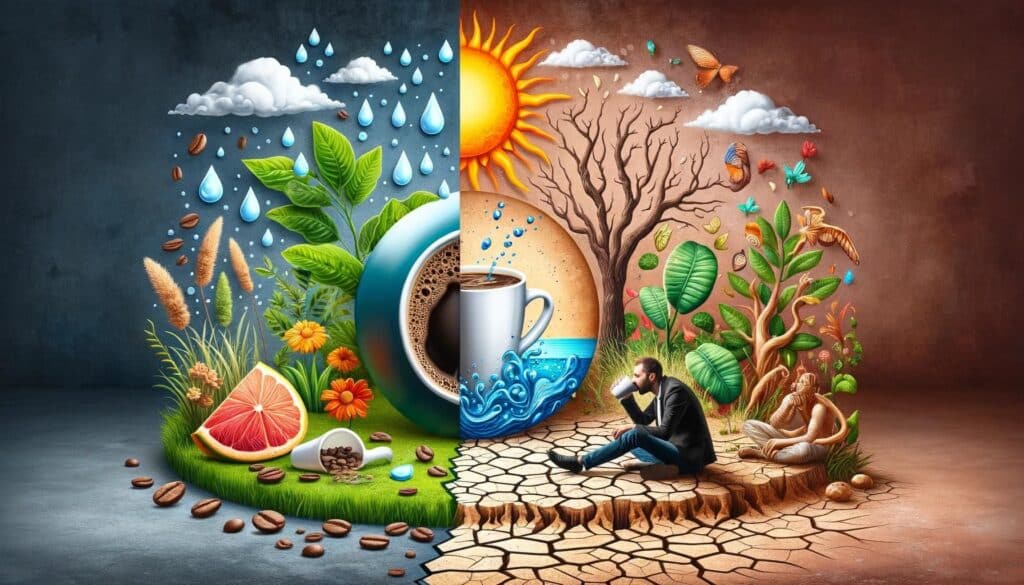
What Dehydration Means and Why It Happens
Dehydration happens when you lose more water than you drink, leaving your body without enough fluids to work right. You can get dehydrated for many reasons, like not drinking enough water, sweating a lot (maybe because it’s hot or you’re exercising), having diarrhea or vomiting, or peeing more than usual, which could happen because of some medicines or sicknesses. Water is super important for your body to control its temperature, get rid of waste, and keep fluids in balance.
How to Tell If You’re Dehydrated
Your body has ways of telling you when you’re not drinking enough water, from small signals to big alarms, depending on how much water you’ve lost. If you’re starting to get dehydrated, you might feel thirsty, notice your pee is darker, and see that you’re not peeing as much. If things get worse, you might have a dry mouth, feel tired, dizzy, or confused, and in the worst cases, your heart and breathing might speed up. It’s especially important for kids and older people to watch out for these signs because they can get dehydrated more easily.
The Importance of Staying Hydrated for Health and Well-Being
Maintaining hydration is crucial for overall health and well-being. Water is essential for various bodily functions, including:
- Digestion and Nutrient Absorption: Water aids in digesting food and absorbing nutrients, ensuring the body receives the vitamins and minerals it needs.
- Detoxification: It helps the kidneys to filter waste and toxins from the blood, promoting healthy detoxification.
- Temperature Regulation: Sweating and respiration, processes that rely on water, help regulate body temperature during exercise and in hot environments.
- Cognitive Function: Adequate hydration is vital for maintaining cognitive functions, such as concentration and memory. Dehydration can affect mood and brain performance.
Given the critical roles water plays in the body, staying hydrated is not just about quenching thirst; it’s about supporting the body’s functions and enhancing physical performance. It’s recommended to drink fluids regularly throughout the day, especially before, during, and after exercise, and during hot weather or when you’re unwell. Understanding the balance between fluid intake and loss is key to preventing dehydration and ensuring the body operates optimally for health and vitality.
Coffee and Its Components
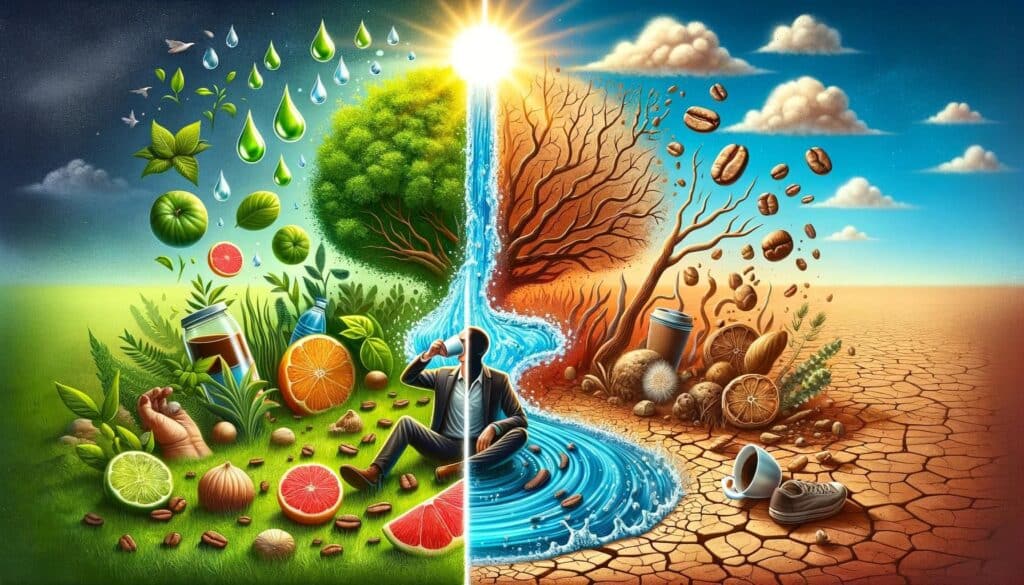
All About Coffee and What’s In It
People all over the world love coffee for more than just its taste. It’s a mix of water and a bunch of stuff pulled out of roasted coffee beans. These beans come from the Coffea plant and have to be roasted, ground up, and brewed to make the delicious and fragrant drink we all enjoy. Coffee’s most famous for having caffeine, which wakes us up and keeps us going. But it also has a lot of other things in it, like antioxidants, acids, and oils, that make it taste and smell great and might even be good for our health.
How Caffeine Works in Our Bodies and Its Effect on Water
Caffeine kicks our nervous system into gear, helping us shake off sleepiness and stay sharp. It blocks a sleep-promoting brain signal called adenosine, which makes our brain’s alert signals like dopamine and norepinephrine work harder. This doesn’t just help us stay awake but can also mess with how much water our body holds onto.
People used to think caffeine made you pee a lot, which could make you dehydrated. But the more we study it, the more we see that if you drink coffee often, your body gets used to the caffeine, and it doesn’t really make you lose more water than usual. As long as you’re drinking water too, a few cups of coffee a day won’t dry you out.
Coffee’s Other Bits That Might Touch on Hydration
But caffeine isn’t the only thing in coffee. Here are some other components:
- Antioxidants: Coffee’s packed with stuff like chlorogenic acid that fights inflammation and takes down harmful free radicals. They don’t directly keep you hydrated, but they’re great for your overall health, which helps your body manage its water better.
- Minerals: There’s also a bit of magnesium and potassium in coffee, important for keeping your body’s fluid and electrolyte levels balanced. These minerals can help make up for any water you might lose because of the caffeine.
- Acids: Coffee’s got some acid in it too, which can sometimes upset your stomach. This isn’t about hydration directly, but if your stomach’s upset, you might end up losing more fluids, so drinking enough water is key.
So, while caffeine gets a lot of the attention when we talk about coffee and water in our bodies, coffee actually has a whole bunch of things that could affect how hydrated we are. For most of us, drinking coffee in a regular amount is fine and won’t throw off our water balance, especially if we make sure to drink plenty of water too.
The Science Behind Coffee and Hydration
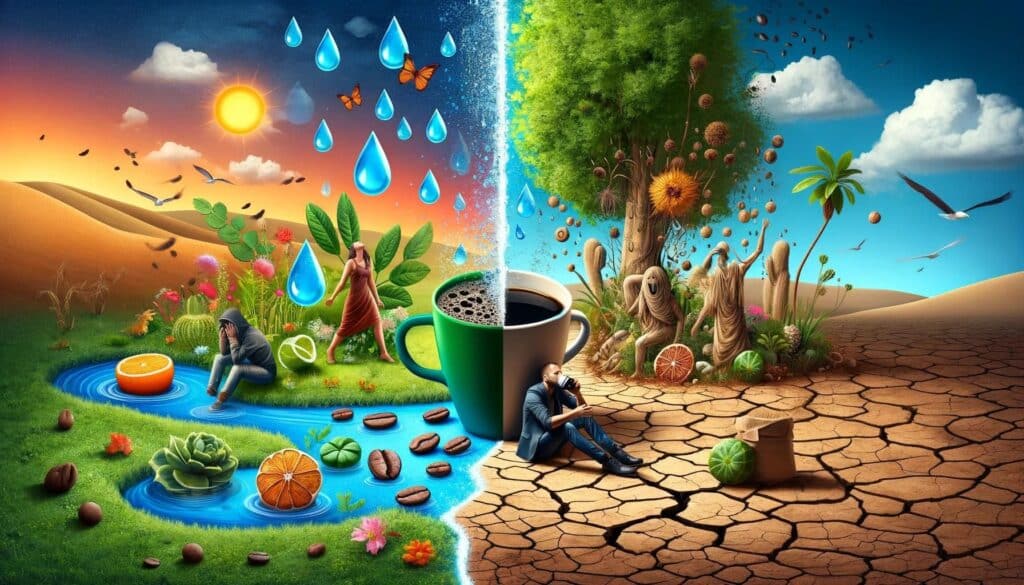
Summary of Scientific Studies on Caffeine’s Diuretic Effect and Hydration
Numerous studies have delved into the relationship between caffeine intake, particularly from coffee, and its impact on the body’s hydration status. Early research labeled caffeine as a potent diuretic, suggesting that coffee consumption could lead to dehydration due to increased urine output. However, more recent and comprehensive studies have nuanced these findings, indicating that the diuretic effect of caffeine is more modest than previously thought, especially in habitual coffee drinkers. For instance, a study published in the Journal of Human Nutrition and Dietetics concluded that coffee, when consumed in moderation by regular coffee drinkers, has a very similar hydrating effect to water. This shift in understanding underscores the adaptability of the human body to regular caffeine intake and suggests that for most individuals, coffee does not significantly impact overall hydration levels.
How the Body Adapts to Regular Caffeine Intake and Its Implications for Hydration
The body’s ability to adapt to regular caffeine consumption is a key factor in mitigating its diuretic effect. With habitual use, the body develops a tolerance to caffeine’s effects, meaning that the increased urination typically seen with initial caffeine use diminishes over time. This adaptation suggests that for regular coffee consumers, caffeine induces less fluid loss than in those who consume coffee sporadically. Therefore, the potential dehydrating effect of caffeine is significantly reduced in people who drink coffee regularly, making it less of a concern for hydration.
Comparing the Hydration Effects of Coffee with Other Beverages
Comparative studies have examined the hydration effects of coffee against water and other beverages to understand its place within a hydrating diet. Research, including a study published in PLOS ONE, indicates that the hydration indices for coffee are comparable to those of water for regular coffee drinkers. This challenges the notion that coffee should be avoided in the interest of maintaining hydration. While water is undoubtedly the most effective way to hydrate, coffee, consumed in moderation, does not significantly detract from the body’s hydration status. It’s worth noting, however, that beverages with higher water content and essential electrolytes, like sports drinks or coconut water, may offer superior hydration under certain conditions, such as intense physical activity or recovery from illness.
In conclusion, the science indicates that coffee, particularly for those who consume it regularly, does not pose a significant risk of dehydration and can be a part of a healthy hydration strategy. The key is moderation and listening to one’s body, ensuring that coffee consumption is balanced with intake of pure water and other hydrating fluids.
Factors That Influence Coffee’s Hydrating Effects
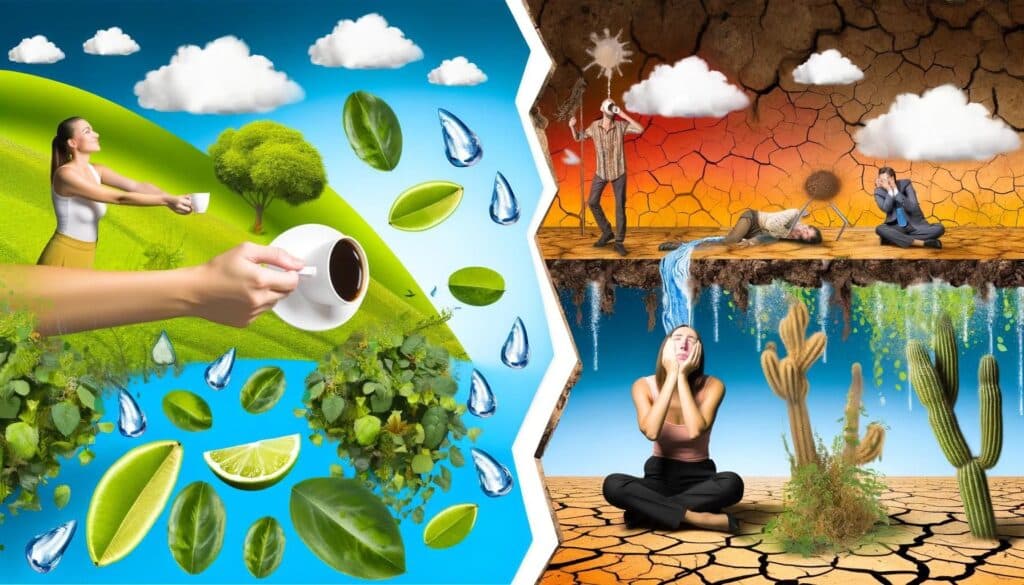
How Different Amounts of Coffee Consumption May Affect Hydration Differently
The impact of coffee on hydration can vary significantly depending on the amount consumed. Moderate coffee consumption, generally defined as 3 to 4 cups per day (equivalent to approximately 400 milligrams of caffeine), is unlikely to cause dehydration in most people. However, drinking coffee in large quantities may increase the risk of dehydration due to its diuretic properties, especially in individuals who are not accustomed to high caffeine intake. The body’s response to caffeine is dose-dependent; higher amounts can exaggerate its diuretic effect, leading to increased fluid loss through urination. It’s essential for individuals to monitor their coffee intake and adjust it based on their hydration needs, particularly in situations where they are losing more fluids, such as during intense exercise or in hot weather.
The Role of Individual Tolerance to Caffeine
Individual tolerance to caffeine is a critical factor in determining coffee’s hydrating effects. Tolerance levels can vary widely among individuals due to genetic differences, the frequency of caffeine consumption, body weight, and overall health. Those with higher caffeine tolerance are less likely to experience significant diuretic effects from drinking coffee, as their bodies have adapted to its presence. Conversely, individuals with low caffeine tolerance may find even small amounts of coffee to increase urination and potentially affect hydration. Understanding one’s tolerance can help in making informed decisions about coffee consumption to maintain optimal hydration.
Other Factors Influencing Hydration When Consuming Coffee
Apart from the amount of coffee consumed and individual tolerance levels, several other factors can influence hydration status:
- Activity Level: Higher levels of physical activity increase sweat production, which can lead to greater fluid loss. Active individuals may need to increase their water intake to compensate for this loss, regardless of their coffee consumption.
- Environmental Conditions: Hot or dry climates increase the body’s need for water due to higher rates of evaporation from the skin and respiratory tract. In such conditions, even moderate coffee drinkers may need to pay closer attention to their hydration status.
- Age and Health Status: Certain populations, such as the elderly, pregnant women, and those with specific health conditions (e.g., kidney diseases), may be more sensitive to the effects of caffeine on hydration. These groups should be particularly mindful of their coffee intake and hydration levels.
- Consumption of Other Diuretic Substances: The combined effect of caffeine with other diuretics (such as alcohol or certain medications) can amplify fluid loss, necessitating a higher intake of water to maintain hydration.
In summary, while coffee can fit into a healthy lifestyle without significantly affecting hydration for most people, it’s important to consider individual factors and circumstances. By paying attention to coffee intake, caffeine tolerance, physical activity levels, environmental conditions, and overall health status, individuals can enjoy coffee without compromising their hydration.
Practical Advice for Coffee Drinkers
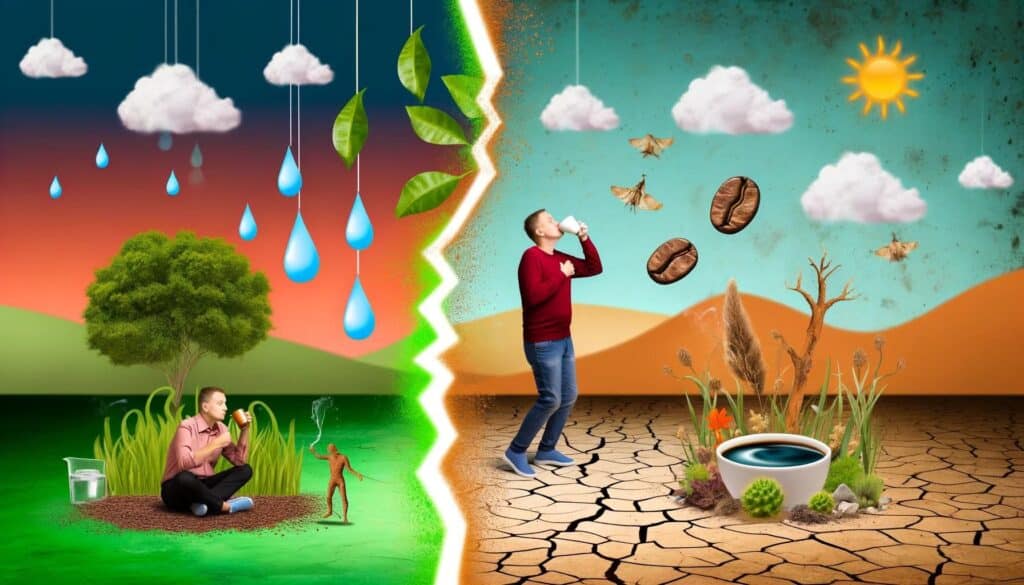
Guidelines for Enjoying Coffee Without Compromising Hydration
- Moderation is Key: Stick to the general guideline of 3 to 4 cups of coffee per day to avoid potential dehydration effects. Consider your tolerance and adjust accordingly.
- Monitor Your Body: Pay attention to signs of dehydration, such as thirst, dark urine, and reduced urination. These can be indicators that you need to increase your water intake.
- Hydrate Between Cups: Make it a habit to drink a glass of water for every cup of coffee you consume. This can help offset any potential diuretic effects and maintain hydration.
- Choose Your Coffee Wisely: Opt for regular, black coffee over high-calorie or sweetened coffee drinks, as the added sugars and fats can impact your overall health and hydration.
- Consider Timing: Drinking coffee late in the day can affect sleep quality, which in turn can impact hydration. Try to consume coffee earlier in the day to ensure it doesn’t interfere with your sleep patterns.
How to Recognize if Your Coffee Consumption Might Be Affecting Your Hydration Status
Be aware of the following signs that may indicate your coffee consumption is impacting your hydration:
- Increased Thirst: Feeling unusually thirsty after drinking coffee could suggest a need for more water.
- Changes in Urine: Dark-colored urine or urinating less frequently than usual can be signs of dehydration.
- Physical Symptoms: Experiencing headaches, dry mouth, or dizziness after consuming coffee may indicate dehydration.
- Overreliance on Coffee for Energy: If you’re drinking coffee to combat persistent tiredness, it might be masking the symptoms of dehydration.
Tips for Balancing Coffee Intake with Adequate Water Consumption
- Start Your Day with Water: Before reaching for your first cup of coffee, drink a glass of water to ensure you start your day hydrated.
- Use a Hydration Tracker: Consider using an app or a journal to track your fluid intake. Aim for at least 8 cups (about 2 liters) of fluids per day, more if you’re active or live in a hot climate.
- Alternate Beverages: Incorporate other hydrating beverages into your routine, such as herbal teas or flavored water, to diversify your fluid intake without adding caffeine.
- Listen to Your Body: Adjust your coffee and water intake based on your daily activities, health status, and how you feel. Your body’s needs can vary from day to day.
- Rehydrate Post-Coffee: If you enjoy coffee after a workout or in hot weather, follow it with extra water to compensate for increased fluid loss.
By following these practical guidelines, coffee lovers can continue to enjoy their favorite beverage without compromising their hydration status. Remember, individual needs can vary, so it’s important to listen to your body and adjust your habits accordingly.
Alternative Hydrating Beverages for Coffee Lovers
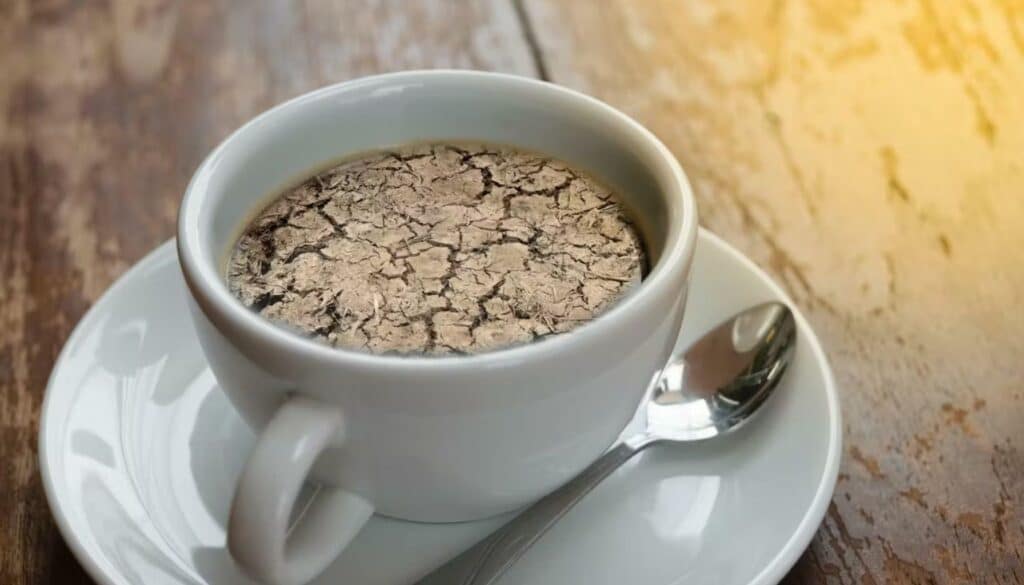
For coffee enthusiasts looking to diversify their beverage intake while staying hydrated, several delicious and healthful options can complement or substitute for coffee. These alternatives can offer hydration benefits, along with a variety of flavors and nutritional advantages, making your hydration efforts both enjoyable and beneficial.
Herbal Teas
- Types: Chamomile, peppermint, hibiscus, and rooibos are excellent choices, offering unique flavors without caffeine.
- Benefits: Herbal teas can soothe the digestive system, offer calming effects, and provide antioxidants, depending on the herbs used.
Fruit-Infused Water
- Preparation: Add slices of fruits like lemon, lime, berries, or cucumber to water for a refreshing twist.
- Benefits: This adds a subtle flavor to your water without sugar or calories, making hydration more enjoyable. The fruits also supply vitamins and antioxidants.
Coconut Water
- Highlights: A natural beverage that’s rich in electrolytes such as potassium, magnesium, and sodium.
- Benefits: Excellent for rehydration, especially after exercise, coconut water can replenish electrolytes lost through sweat more effectively than plain water.
Vegetable Juices
- Options: Consider homemade or low-sodium vegetable juices made from tomatoes, carrots, beets, or greens.
- Benefits: They provide hydration along with a boost of vitamins, minerals, and antioxidants. However, be mindful of the sodium content in store-bought versions.
Green Tea
- Note: While green tea contains caffeine, its levels are lower than those in coffee. It’s also rich in antioxidants.
- Benefits: It offers a gentle energy boost along with health benefits, including improved brain function and fat loss.
Sparkling Water
- Variety: Unsweetened sparkling water or those flavored with natural essences offer a fizzy alternative without added sugars or artificial ingredients.
- Benefits: A good option for those who miss the texture of carbonated beverages but want to avoid caffeine and added sugars.
Milk and Plant-Based Alternatives
- Choices: Skim, 1%, or plant-based options like almond, soy, and oat milk can be nutritious alternatives.
- Benefits: These options provide hydration along with calcium, vitamin D, and in the case of plant-based milks, various nutrients specific to the source.
The Benefits of Diversifying Your Beverage Intake for Optimal Hydration
- Nutritional Variety: Different beverages can supply a range of vitamins, minerals, and antioxidants, contributing to a well-rounded diet.
- Hydration Without Boredom: Changing up your beverage choices can make staying hydrated more interesting and enjoyable, encouraging you to drink more throughout the day.
- Reduced Caffeine Intake: By incorporating non-caffeinated beverages into your routine, you can avoid the potential diuretic effects of excessive caffeine consumption, leading to better hydration.
- Support for Different Health Goals: Whether you’re looking for calming effects, digestive support, or a post-workout rehydration solution, there’s a beverage that can cater to your specific needs.
Incorporating a variety of hydrating beverages into your daily routine can enhance your overall hydration strategy, offering both health benefits and enjoyable alternatives to coffee lovers.
Conclusion
In our journey to understand how coffee affects our hydration, we’ve discovered some important truths that bust myths and offer advice to those of us who love coffee. We found out that even though the caffeine in coffee can make you pee a little more, drinking coffee in moderation doesn’t really dehydrate most people, especially if they drink coffee often. Our bodies are pretty awesome at getting used to caffeine, so lots of us can enjoy coffee without it messing with how hydrated we are.
We also talked about how important it is to know how much coffee works for you, considering things like how active you are and the weather. If you keep an eye on these factors, you can have coffee without giving up on staying hydrated.
As we wrap this up, we’re saying go ahead and enjoy your coffee, but do it wisely. Let coffee be a part of your day that brings you happiness and comfort. Just make sure to listen to what your body needs when it comes to water. Mixing in water and other drinks that help you stay hydrated, and adjusting how much coffee you drink based on what feels right for you, are good ways to keep your body happy and hydrated.
It’s all about knowing what your body needs. General tips are a good place to start, but paying attention to how your body reacts to coffee and water is key. If you have special health needs or questions about staying hydrated or how much coffee is okay for you, talking to a doctor or a health expert is a smart move.
Coffee is a special part of the day for so many of us around the world. By being smart and making informed choices, we can keep enjoying coffee while also taking good care of our health and hydration.
FAQs: Coffee Consumption and Hydration
Can I count coffee towards my daily fluid intake?
Yes, you can count coffee towards your daily fluid intake. Despite coffee’s diuretic properties, moderate coffee consumption contributes to your overall hydration status. Research suggests that for regular coffee drinkers, the body adapts to caffeine over time, diminishing its diuretic effect. Thus, coffee, when consumed in moderation, can be part of your daily fluid intake, along with water and other beverages.
How much coffee is too much?
While individual tolerance varies, a general guideline is that up to 400 milligrams of caffeine per day — roughly equivalent to 3 to 4 eight-ounce cups of coffee — is considered safe for most adults. Consuming more than this amount may lead to negative effects for some people, including disrupted sleep patterns, increased heart rate, anxiety, or dehydration in those sensitive to caffeine’s diuretic effects. Listening to your body and adjusting your intake based on personal sensitivity to caffeine is crucial.
Does the type of coffee (e.g., espresso, drip) matter for hydration?
The main factor to consider is the caffeine content, which can vary significantly between different coffee types. Espresso has more caffeine per ounce but is usually served in smaller servings than drip coffee. The overall impact on hydration largely depends on the total volume of coffee and its caffeine content rather than the type of coffee per se. Regardless of the type, balancing your coffee intake with water and other hydrating fluids is key.
Can decaf coffee be a better option for hydration?
Decaf coffee is an excellent alternative for those concerned about caffeine’s diuretic effects or those sensitive to caffeine. It contains only trace amounts of caffeine and can contribute to your daily fluid intake more directly without the potential for increasing dehydration. Decaf can be particularly beneficial in the afternoon or evening when caffeine might disrupt sleep patterns.
How can I mitigate the diuretic effects of coffee?
To mitigate the diuretic effects of coffee, ensure you are also consuming ample water throughout the day. A good practice is to drink a glass of water for every cup of coffee you have. Additionally, incorporating hydrating foods into your diet, such as fruits and vegetables with high water content, can help maintain your hydration levels.
Is it true that coffee causes you to lose more electrolytes along with fluids?
Coffee can increase the excretion of sodium and potassium to a small extent, but for most people, this loss is minimal and can be easily compensated by a balanced diet. If you are consuming coffee in moderation and maintaining a healthy diet, the loss of electrolytes should not be a significant concern. For individuals with specific health conditions or dietary restrictions, consulting with a healthcare professional for tailored advice is recommended.
References and Further Reading
- GoodRx. (n.d.). Does coffee dehydrate you? GoodRx. Retrieved from https://www.goodrx.com/well-being/diet-nutrition/does-coffee-dehydrate-you
- Mayo Clinic Staff. (2020, October 14). Caffeinated drinks: Do they dehydrate you? Mayo Clinic. Retrieved from https://www.mayoclinic.org/healthy-lifestyle/nutrition-and-healthy-eating/expert-answers/caffeinated-drinks/faq-20057965
- Link, R. (2021, January 16). Does coffee dehydrate you? Healthline. Retrieved from https://www.healthline.com/nutrition/does-coffee-dehydrate-you

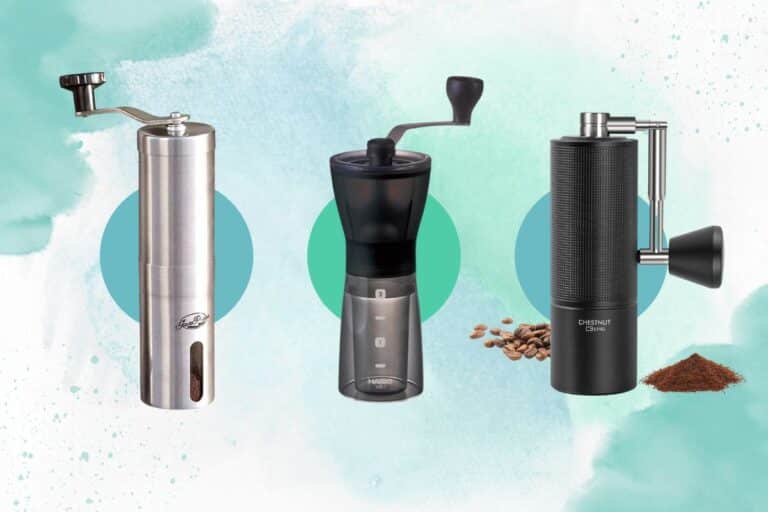
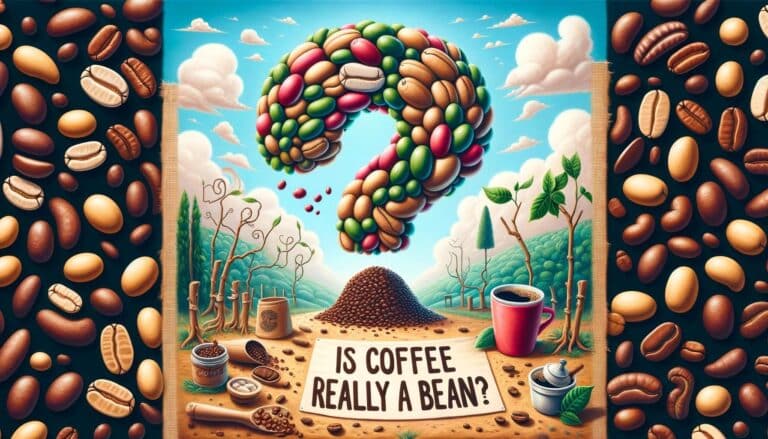
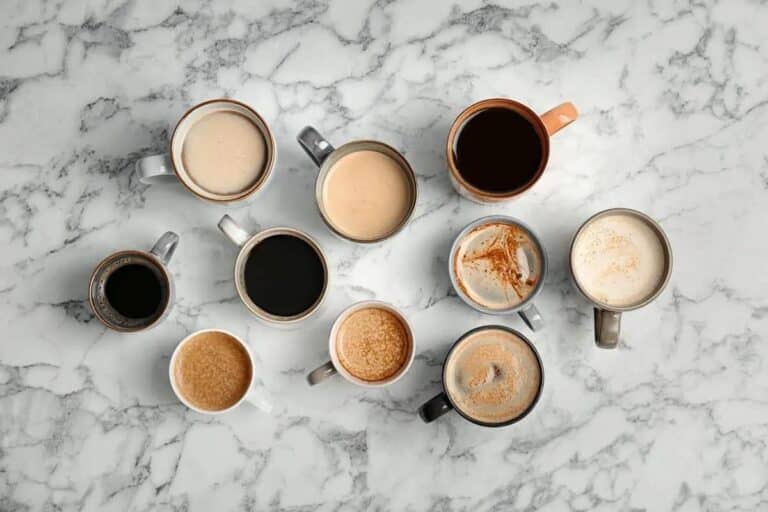



1 thought on “Does Coffee Dehydrate You?”
very informative!